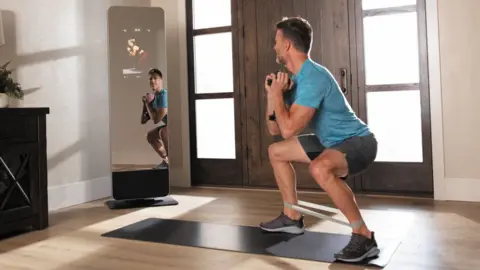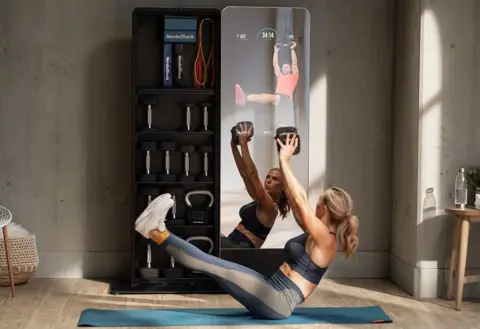The high-tech fitness mirrors that aim to get you exercising more
 iFit
iFitFor most people, including fitness fans, the thought of having to watch yourself work out is not an appealing one.
We don't look our best while sweating on a treadmill or grimacing on a weights machine.
Yet as any gym-goer knows, there are always some individuals who like to admire their reflection in the floor-length mirrors.
It is perhaps these particular keep-fit enthusiasts who are most thrilled about the latest trend in home exercise - smart fitness mirrors.
These are 6ft (180cm) or so tall, vertical, high-tech mirrors that contain a computer, hook up to the internet, and also work as a video screen.
The idea is you connect with an online trainer, who then appears on the mirror/screen along with your reflection.
On the more advanced devices the mirror is fitted with cameras and speakers, so the trainer can observe your movements, and suggest tweaks and changes.
Users have the option of live one-to-one lessons or group classes, with a number of workouts, including weights, Pilates, cardio, and yoga.
On the simpler mirrors the video and sound is just one-way - you can see and hear the trainer, but not the other way around. Lessons are typically not live, instead you access a library of streamed workout videos.
 iFit
iFitWhether you go for a higher-spec model, or more basic offering, you typically pay at least £1,000 ($1,300) for the mirror, and then a monthly subscription on top.
The touch-screen mirrors are also typically fitted with numerous sensors, connected to an artificial intelligence (AI), which can give feedback on your movements, and suggest improvements.
The first such mirror to go on sale in the UK was the Vaha. Made by the German firm of the same name, it hit the market last year. Rival brands include Tonal, Mirror, NordicTrack, Portl, and ProForm.
Vaha describes its mirror as "delivering full personalised, immersive sessions for body, mind and nutritional health".
But is there any actual advantage to being able to watch yourself workout?
 Care OS
Care OSColleen Logan, vice president of public relations at iFit, the US-owner of both Nordic Track and ProForm, says that seeing yourself on the mirror allows the user "to adjust their form [or position], so they get the optimum benefits of the strength exercise and minimize errors in form that could lead to injuries".
Dr Anthony Papathomas, a sports and fitness psychologist at Loughborough University says that there is merit to this argument, but that he also has some concerns.
"From a psychological perspective, exercising in front of your reflection might provide important feedback; for example on running technique or weight lifting form," he says. "It may also appeal to people's aesthetic motivations for exercise - you can see the muscles in action and that can feel rewarding."
Mr Papathomas adds: "My concern would be how do people with body image insecurities feel about this? It may be a problem for those new to exercise and looking to make a lifestyle change.
"Even for regular exercisers, we know there are many who experience body dysmorphia or eating disorders, and for them, seeing a reflection throughout their exercise might be troubling."
A similar form of high-tech mirror is also now entering the market - smart wellness mirrors. These are mirrors that use sensors and AI to evaluate a user's skin and underlying health.


New Tech Economy is a series exploring how technological innovation is set to shape the new emerging economic landscape.

French firm CareOS makes two such products, which are designed to replace the current mirror above the sink in your bathroom.
Its mirrors use a camera, and infrared and ultraviolet light sensors to analyse a person's skin and temperature, and then suggest a number of care routines. The user can also access subscription-based skincare tutorials.
Violaine Monmarche, CareOS's co-founder, explains that the mirror works with both motion and voice control.
 CareOS
CareOS"The bathroom is a place where you have your hands full, or wet, or with cream on them, so.. the mirror is touchless - you just have to gesture in front of it," she says.
Dr Anoob Pakkar-Hull, a medical aesthetic, or beauty, consultant at Harley Street Specialist Hospital in London, says that this new technology "has made the famous line 'mirror, mirror, on the wall, who's the fairest of them all?' become a reality".
He adds: "Advances made in artificial intelligence, augmented reality, and facial recognition bring a plethora of opportunities that we must leverage to give people the ability to capably assess and manage their health from home."
However Dr Pakkar-Hull says he still has concerns about their accuracy, and the lack of touch interaction. "Certain medical problems require palpation [touch] in order for the condition to be diagnosed appropriately."
 Anoob Pakkar-Hull
Anoob Pakkar-HullConsultant psychologist Dr Elena Touroni also has concerns about both fitness and wellbeing smart mirrors.
"For someone who is already focused on perfection, and perhaps already notices every perceived 'flaw' in their body, these mirrors could end up amplifying these kinds of psychological difficulties," she says.
Fellow psychologist Lee Chambers agrees that there is a risk of people obsessing about "working to perfection". Yet he adds that the smart mirrors do "have the ability to empower health choices and nudge health behaviours".
He adds that exercise mirror should also be very useful for people who don't have time to go to the gym, but still want feedback on how they are getting on.
